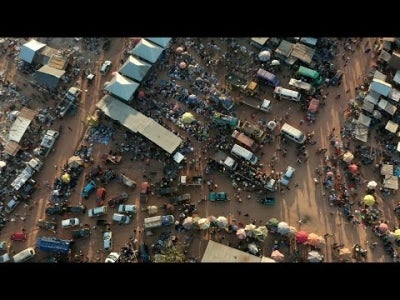
Tajikistan is one of the poorest former Soviet republics. Here, with over 30 per cent of the population living below the national poverty line, a sick family member, a poor harvest or lost livestock can mean the difference between struggle and survival for many of the nation’s 8 million citizens.
So when sheep and cattle started dying in remote Khatlon Oblast, the impact was immediate.
“Personally I lost one cow, but one of my neighbours lost many sheep and cattle,” local herder Ish Mohammed says. “I would have sold the cow to buy food for the family and winter grazing for the animals. It had a serious impact for our family.”
The poison at the roots of the villagers’ problem was dichloro-diphenyl-trichloroethane, or DDT. The sprawling Vakhsh site in Khatlon is just one of an estimated 70 obsolete pesticide burial sites around Tajikistan, deadly legacies of the country’s Soviet past.
Obsolete pesticides pose a significant threat in many former Soviet nations, where poorly managed and contained storage sites contain some of the world’s largest stockpiles of these hazardous chemicals. While Tajikistan heavily restricts DDT use under the Stockholm Convention on Persistent Organic Pollutants, illegal use of the chemical is common, with much of the black-market supply mined from pesticide burial sites. The Vakhsh site alone reportedly contains over 4,000 tonnes of obsolete pesticides, including large volumes of DDT.
With support from the Global Environment Facility, UN Environment and partners Green Cross Switzerland, the World Health Organisation and the Tajik Committee for Environmental Protection have been working to safely contain these sites and their contents, working with local authorities to manage the health and environmental threats posed by DDT and other hazardous chemicals.
A central storage facility has now been built at Vakhsh and the site securely fenced off, bringing an end to the illegal chemical mining that was once commonplace. The fences keep livestock away from the site, stopping them grazing on the site’s toxic soil and drinking from the heavily polluted standing water in its excavation pits.
“I am very thankful for the government and agencies who have been involved in solving this problem,” Ish Mohammed says. “People have been informed of the health dangers – that it can affect people as well as livestock. Since then I have been very careful about this issue.”
Pollution is the theme of the 2017 United Nations Environment Assembly, which is meeting in Nairobi from 4 to 6 December. Sign the pledge and help us #BeatPollution around the world. Together, we can clean up the planet.
This story was originally published by UNEP.


